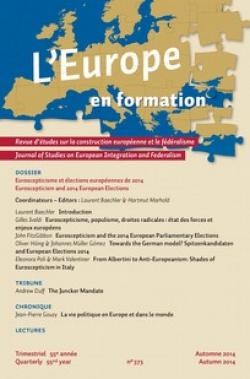From Albertini to Anti-Europeanism: Shades of Euroscepticism in Italy

Euroscepticism is far from being a new phenomenon and largely predates the outbreak of the financial crisis. Indeed, the disturbing detachment between European citizens and European Union (EU) institutions has been a central issue of the European public debate over the last two decades, in which popular and government support for European integration has steadily decreased among the majority of Member States (MS). Initially however, Italy rather stood out as it followed an opposite trend within the European growing eurosceptic panorama. Inspired by the likes of Italian pro-European federalists such as Mario Albertini or Altiero Spinelli, Italy was considered to be one of the most pro-European Member States in the Union. Yet, the Great Recession and the euro area sovereign debt crisis resulted in the rise of new anti-establishment and anti-European movements all around the MS, including Italy. To date, with only 34 per cent of the Italians still trusting the European institutions, Italian pro-Europeanism à la Albertini suddenly seems at stake.
-
Dati bibliografici
in L'Europe en Formation, No. 373 (Autumn 2014), p. 66-78
Introduction
Varieties of Euroscepticism
Italian Parties behaviours within the European Parliament Electoral Campaign
Euroscepticms Vs Eurocriticism
Europhile or not Europhile? Anti-European ideas among Italian mainstream parties
Is the traditional Italian option for European federalism still consensus in Italy?



